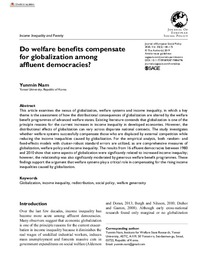Do welfare benefits compensate for globalization among affluent democracies?

Journal of European Social Policy
2020
30
2
May
158-175
welfare state ; income distribution ; globalization ; income redistribution
Social protection
https://doi.org/10.1177%2F0958928719886796
English
Bibliogr.
"This article examines the nexus of globalization, welfare systems and income inequality, in which a key theme is the assessment of how the distributional consequences of globalization are altered by the welfare benefit programmes of advanced welfare states. Existing literature contends that globalization is one of the principle reasons for the current increases in income inequality in developed economies. However, the distributional effects of globalization can vary across disparate national contexts. The study investigates whether welfare systems successfully compensate those who are displaced by external competition while reducing the income inequalities caused by globalization. For the empirical analysis, both random- and fixed-effects models with cluster-robust standard errors are utilized, as are comprehensive measures of globalization, welfare policy and income inequality. The results from 16 affluent democracies between 1980 and 2010 show that some aspects of globalization were significantly related to increased income inequality; however, the relationship was also significantly moderated by generous welfare benefit programmes. These findings support the argument that welfare systems play a critical role in compensating for the rising income inequalities caused by globalization."
Digital
The ETUI is co-funded by the European Union. Views and opinions expressed are however those of the author(s) only and do not necessarily reflect those of the European Union or the ETUI.